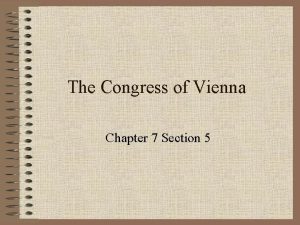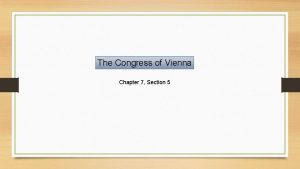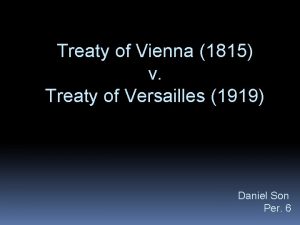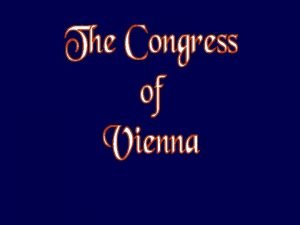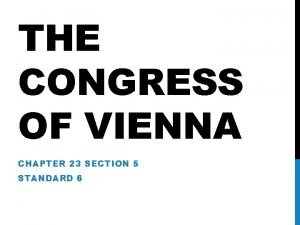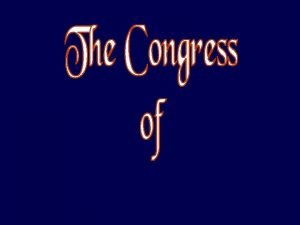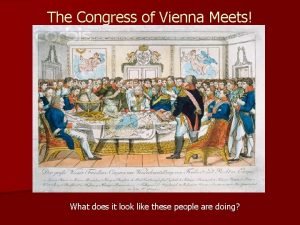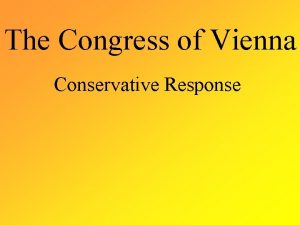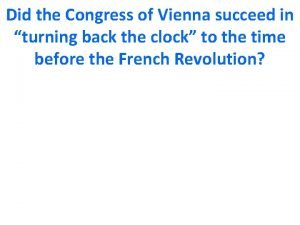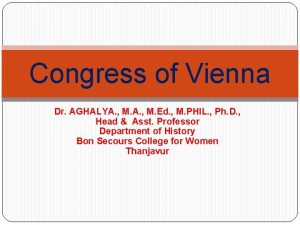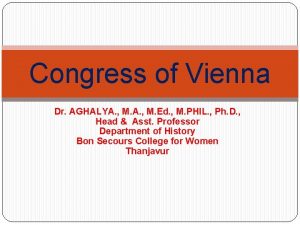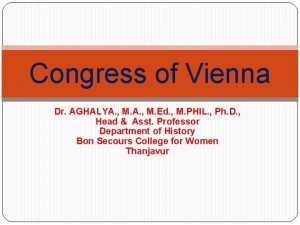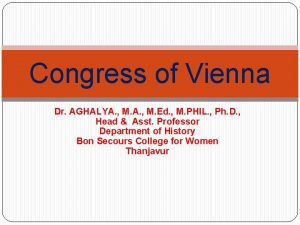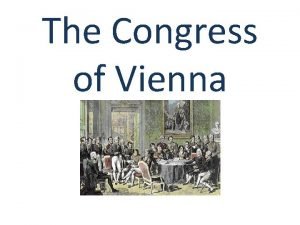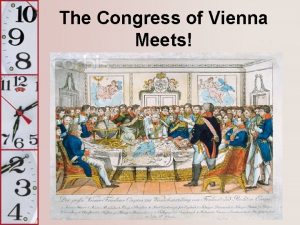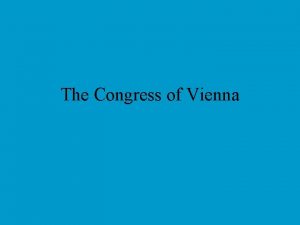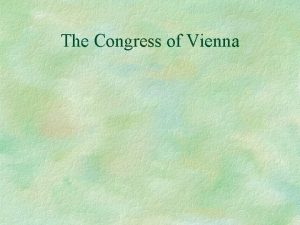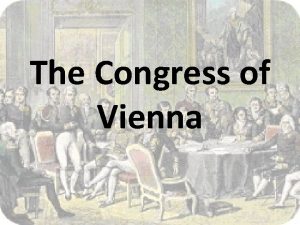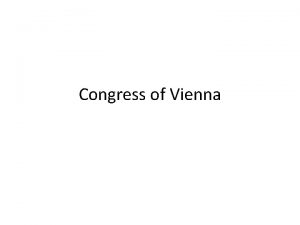Congress of Vienna Dr AGHALYA M Ed M













- Slides: 13

Congress of Vienna Dr. AGHALYA. , M. Ed. , M. PHIL. , Ph. D. , Head & Asst. Professor Department of History Bon Secours College for Women Thanjavur


INTRODUCTION �Congress of Vienna, assembly in 1814– 15 that reorganized Europe after the Napoleonic Wars. �It began in September 1814, five months after Napoleon I’s first abdication and completed its “Final Act” in June 1815, shortly before the Waterloo campaign and the final defeat of Napoleon. �The settlement was the most-comprehensive treaty that Europe had ever seen.


The Vienna Settlement was based on three principles, viz. , 1. restoration, 2. legitimacy’ and 3. compensation. As regards the principle of restoration, it was decided to restore, as far as possible, the boundaries and reigning families of the several European countries as they were before the French Revolution and the rise of Napoleon.

Napoleon had badly mutilated the political map of Europe. He had tom away territories from some States and added them to other States to suit his convenience.

The Congress of Vienna �The Congress of Vienna was held from September of 1814 to June of 1815. �After the downfall of Napoleon Bonaparte, this international conference was called to create a balance among the European powers in such a way so as to prevent future wars and maintain peace and stability on the European continent. �The means of achieving this goal would be through a major reshaping of European interior borders.

Important People: � Though the conference opened with a series of glittery balls and conferences, the delegates soon got down to work. � Mainly, the four major powers of Europe (Austria, Russia, Prussia, and Great Britain) were left to make most of the big decisions. � Austria sent Prince Klemens von Metternich, the Austrian minister of State who was also acting as a president of the Congress. � The Russian Empire was represented by Alexander I, the emperor of The Congress of Vienna Russia.

Important People: � The main delegate from Prussia was Prince Karl August von Hardenberg, and Great Britain was represented by Lord Castlereagh, and later Arthur Wellesley, the first duke of Wellington. � This group of major powers decided that France, Spain, and the smaller powers would have no voice in important decisions. � However, the French diplomat, Charles Maurice de Talleyrand, was successful in allowing France to have an equal voice in the negotiations. � Talleyrand became the deciding vote in many of the decisions.

Important Decisions: � France was deprived of all territory conquered by Napoleon. � The French monarchy was restored under the rule of Louis XVIII. � Austria was given back most of the territory it had lost and was also given land in Germany and Italy (Lombardy and Venice). � Russia got Finland control over the new kingdom of Poland. � Prussia was given much of Saxony and important

Important Decisions: � Britain got several strategic colonial territories, and they also gained control of the seas. � The Dutch Republic was united with the Austrian Netherlands to form a single kingdom of the Netherlands under the House of Orange. � Norway and Sweden were joined under a single ruler. � Switzerland was declared neutral and Spain was restored under Ferdinand VII

Results of the meeting: �The goal of the congress was to re-establish a balance of power among the countries of Europe and have peace between the nations. �The Congress proved to be highly successful in achieving its goal, for the peace in Europe was left almost undisturbed for nearly 40 years.

 Congress of vienna quiz
Congress of vienna quiz Chapter 23 section 5 the congress of vienna
Chapter 23 section 5 the congress of vienna Chapter 23 section 5 the congress of vienna
Chapter 23 section 5 the congress of vienna The congress of vienna chapter 23 section 5
The congress of vienna chapter 23 section 5 Chapter 7 section 5 the congress of vienna
Chapter 7 section 5 the congress of vienna Treaty of versailles 1815
Treaty of versailles 1815 Lte
Lte Congress of vienna worksheet
Congress of vienna worksheet Congress of vienna map before and after
Congress of vienna map before and after Chapter 23 section 5 the congress of vienna
Chapter 23 section 5 the congress of vienna Chapter 23 section 5 the congress of vienna
Chapter 23 section 5 the congress of vienna Congress
Congress Congress of vienna conservatism
Congress of vienna conservatism Did the congress of vienna succeed
Did the congress of vienna succeed

